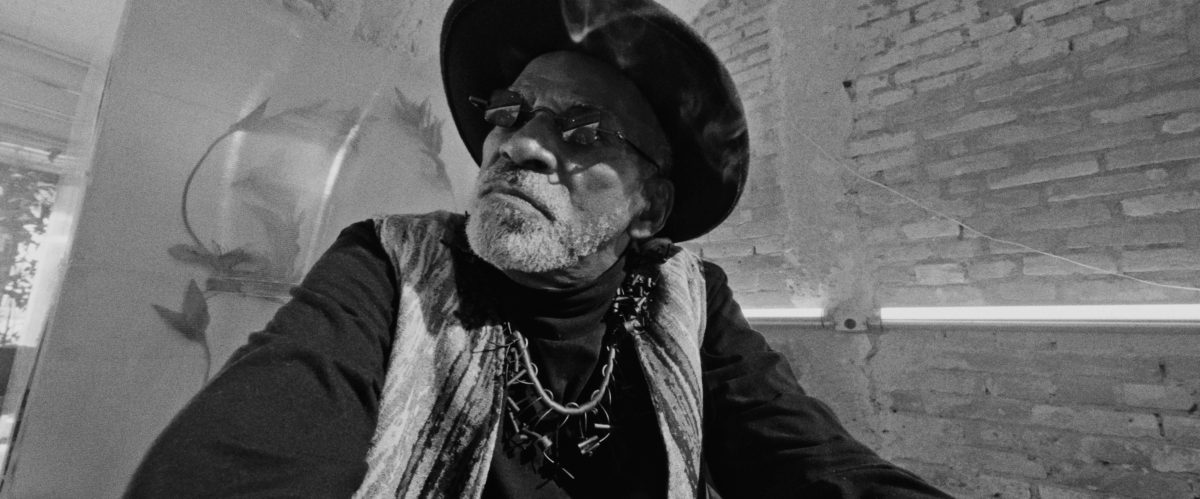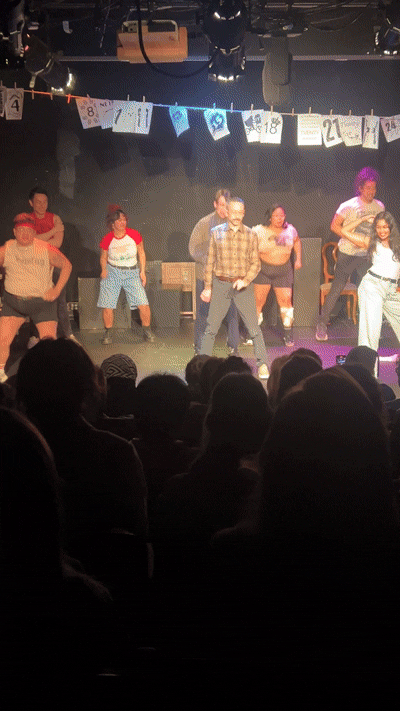This article was made possible by the fine folks at the San Francisco Jewish Film Festival.
What if you accidentally discovered a supposedly lost body of animation work? What sort of Kaddish can be given for notorious financial fraudster Bernie Madoff? What political activism can you perform when you develop ALS? The answers to these questions can be found in some of the films offered in this year’s San Francisco Jewish Film Festival (hereafter “SFJFF”).
In another sign of the Bay Area’s cultural re-opening, the SFJFF returns with its 41st edition. Running from July 22 to August 1, 2021, this annual festival of films from the Jewish diaspora offers a mix of in-theater screenings (the Castro on July 24 & 25) and online streaming for the festival’s duration. Some SFJFF selections are available nationwide. However, the majority of SFJFF 41’s films will have streams geoblocked to California or even just the San Francisco Bay Area, as per digital agreements with individual filmmakers and distributors.
Win tix to the SFJFF right here!
As in previous years, SFJFF presents a mix of feature films, documentaries, short films, and even television programs from around the world. The subjects of this year’s selections include a portrait of famed American novelist Saul Bellow (“The Adventures Of Saul Bellow”), how German youth are taught today about the Holocaust (“The Lesson”), or even the tale of how an Internet search for bookbinding materials turns into a bit of catfishing with someone named MeatMaster 500 (“The Binding Of Itzik”).
Livening up SFJFF 41 are several big night events. Virtual Opening Night honors goes to Sam Hobkinson’s documentary “Misha And The Wolves.” This film follows a high-stakes effort to verify the events recounted in Misha Defonseca’s international best-selling memoir of surviving the Holocaust. The Castro Opening Night slot belongs to the World War II-set tale “Persian Lessons.” Belgian Jew Gilles stays alive as long as he teaches Persian to a German concentration camp officer…and the officer doesn’t discover Gilles truly doesn’t know Persian. In the Centerpiece Documentary “The Conductor,” the viewer learns how internationally renowned symphony conductor Marin Alsop fought sexism to make her mark in the classical music world. “Wet Dog,” the Next Wave Spotlight film, adapts an autobiography about a teen Jewish-Iranian immigrant trying to reconcile his religious heritage with acceptance by his peers.
200 Meters
Here are some suggestions for SFJFF 41 films to try:
200 Meters–The title of Ameen Nayfeh’s drama refers to the distance separating Mustafa’s West Bank home from the apartment his wife and three kids occupy on the Israeli side of the separation wall. Despite having the option to get an Israeli ID allowing for free travel, Mustafa refuses to legitimize an unjust system by doing so. What can he do when his son is injured and his work permit won’t permit him to get to his son’s side? His answer is join a smuggler’s party to bypass the Israeli checkpoints. Then the smugglers abandon Mustafa and his fellow party members during the crossing… The SFJFF Centerpiece Drama will be shown both virtually and at the Castro Theatre.
American Birthright–Director and producer Becky Tahel’s personal documentary sets out to answer the question “Why be Jewish?” Her open-minded search for answers leads her to do everything from studying the Torah in Israel to visiting the country where her sister attended medical school. As the director ticks off items on her “to-Jew list” (yuk yuk), will she find her path in life?
Charlatan–Agnieszka Holland, this year’s SFJFF Freedom Of Expression Award winner, dramatizes the true story of Czech herbalist healer Jan Mikolasek. The healer was supposedly able to diagnose a patient’s illness by merely glancing at a sample of a patient’s urine. As the years pass and Mikolasek treats everyone from the poor to the Nazi occupiers, he eventually falls in love with his assistant Frantisek. However, trouble erupts when Czech President Antonin Zapotocky dies under Mikolasek’s care. The investigation and subsequent trial of both Mikolasek and Frantisek will soon answer whether the healer is the real deal or a fraud.
A Kaddish For Bernie Madoff
A Kaddish For Bernie Madoff–One of SFJFF 41’s more offbeat entries is this film adaptation of Alicia Jo Rabins’ chamber-rock opera. Beginning on Wall Street in 2008, Rabins tells the story of notorious financial fraudster Bernie Madoff and the system that allowed his scam to flourish unhindered for so long. But “telling the story” might not be the best way to describe seeing real-life interviews turn into music videos or ancient spiritual texts transforming into synchronized swimming routines. Available via both streaming and a Castro Theatre screening.
Kings Of Capitol Hill–The American Israel Public Affairs Committee (AIPAC) acts as a political 800-pound gorilla ensuring Washington D.C.’s politicians mute any criticism they may have of the Israeli government’s actions. Yet how did this insanely powerful pro-Israel lobby come to be? Director Mor Loushy presents the largely untold history of AIPAC in an accessible manner, thanks to the participation of key AIPAC insiders. Get ready to learn how one brand of the Washington political lobbying sausage is made.
Labyrinth Of Peace–Featured in the SFJFF TV Spotlight programming section, this 11-hour mini-series about an industrial family dynasty in post-World War II Switzerland is definitely made for home streaming. The mini-series follows the fortunes of Klara, her husband Johann, and his brother Egon. Klara’s caring for displaced Holocaust survivors soon carries her into a dangerous relationship with a survivor named Herschel. Johann’s efforts to save and modernize his father-in-law’s textile company start to mean working with people who committed unspeakable war crimes. Egon’s work in hunting down escaped Nazis for the Attorney General’s office collides with a system favoring profit over accountability.
Prognosis: Notes On Living
The Light Ahead–Bay Area film noir fans associate director Edgar G. Ulmer with the film noir classic “Detour.” But this fine example of pre-WWII American Yiddish cinema shows another side of his talents. It’s set in a poor shtetl frequently hit with disease. Young disabled couple Fishke and Hodel want to leave the shtetl. Their hope of escape lies with local bookseller Mendele. He wants to exploit the shtetl inhabitants’ superstitious nature and a cholera epidemic to broker a black wedding that will help the young couple leave the shtetl.
The Meaning Of Hitler–Petra Epperlein and Michael Tucker’s documentary essay travels to nine different countries to examine what Hitler and his infamous legacy means nowadays. Given the recent rise of white supremacy and anti-semitism, how does the Nazi leader fit in to these trends? Obviously, this film was completed long before the Orange Skull’s admiration of Hitler became publicly known.
Mish Mish–What if you learned that your father used to be an animated film pioneer? That’s what happens to Didier Frenkel when he goes through the large pile of film cans his father Shlomo Frenkel kept in the basement. The elder Frenkel and his brothers were the creative forces behind the popular (and presumed lost) Egyptian cartoon character Mish-Mish Effendi. However, as director Tal Michael’s film shows, the establishment of the state of Israel unexpectedly set off a series of events that would cut short the Frenkel Brothers’ animation career.
Neighbours–This last-minute addition to the SFJFF program is set in the early 1980s in a village near the Syria-Turkey border. 6-year-old Sero lives happily with both his family and his second family, the Jewish next-door neighbors. The boy sees nothing wrong in doing simple tasks around his Jewish neighbors’ house while they observe Shabbat. A new teacher soon shatters Sero’s peaceful existence with his lessons condemning imperialist and Zionist Jews.
Not Going Quietly
Not Going Quietly–SFJFF’s Take Action Spotlight presents the 2021 SXSW Audience Winner For Best Documentary Feature. Political organizer Ady Barkan’s bright future seemed permanently dimmed when he developed ALS at age 32. However, a chance meeting on an airplane with Senator Jeff Flake would thrust Barkan into the public eye. Barkan uses his newfound power to launch the people-powered Be A Hero campaign to push for healthcare justice. But can the activist balance his political involvement with his need to develop bonds with his wife and infant son?
Plan A–SFJFF 41’s Closing Night Film is this disturbing thriller based on a true story. Released Buchenwald survivor Max wants revenge. His wife and son are dead, and his home’s been stolen by an anti-Semitic German family. At first, Max joins Michael’s group of Jewish soldiers as they hunt down and execute German officers living safe and comfortable lives. But then the death camp survivor encounters the Nakam. They’re a group of Holocaust survivors whose idea of revenge follows the eye for an eye model. To balance the six million Jews murdered in the Holocaust, the Nakam want to murder six million Germans by poisoning the country’s water mains. If the Nakam succeed, though, they’ll also poison the political possibility of establishing a nation for the Jews. Max volunteers to infiltrate the Nakam to stop them, but his mission may be compromised by his growing sympathy for the group’s deadly plan.
Prognosis: Notes On Living–The SFJFF Local Spotlight features this personal documentary directed in part by Academy Award-winning activist filmmaker Debra Chasnoff. When Chasnoff gets diagnosed with stage-4 breast cancer, she uses her camera to follow to the end her experiences in living with cancer. It’s a journey filled with doctors’ appointments, chemo treatment, and even having bucket list moments. Chasnoff’s emotional trip is made doable thanks to the presence of her wife Nancy, her sons, and her extended LGBTQ+ family.
Those Who Heard & Those Who Saw–Ready for a new example of shameful yet forgotten Canadian history? During the Second World War, the Canadian authorities housed 2,000 Jewish refugees fleeing Germany’s rising fascism in a network of concentration camps located in New Brunswick, Quebec, and Ontario. These refugees were helpless against the brutal treatment their Canadian captors inflicted on them. In the present day, the town of Sherbrooke, Quebec has gone from housing one of these World War II-era prison camps to being a home for Syrian refugees. This experimental essay is less interested in finding similarities between these two situations than in finding insights that can be applied across these two time periods.
Tiger Within
Tiger Within–Unhoused 14-year-old Casey is angry at the world. Her mother cares more about her boyfriend’s welfare than her daughter’s well-being. Her absentee father and his new family want nothing to do with her. Forced to sleep in a Jewish cemetery, the girl is discovered by elderly Holocaust survivor Samuel (Edward Asner). The old man offers the young girl food and a place to sleep, which Casey accepts because she has nothing better. Problems arise when Samuel learns Casey was brought up believing the Holocaust never happened. The swastika on the back of Casey’s jacket doesn’t ease tensions. But to fulfill a promise made to his dead wife, Samuel is determined to befriend Casey and to learn how to forgive the misguided teen. Equally importantly, can Casey learn to forgive herself?
Depending on how many films catch your eye, your ticketing options range from individual film tickets to a 10-Flix or Castro ticket package to even a Festival Streaming Pass. Whichever SFJFF film(s) you wind up choosing to stream, remember to finish watching it within 72 hours from your start time.
The post The Great Stuff Coming To The 41st S.F. Jewish Film Festival appeared first on Broke-Ass Stuart's Website.





